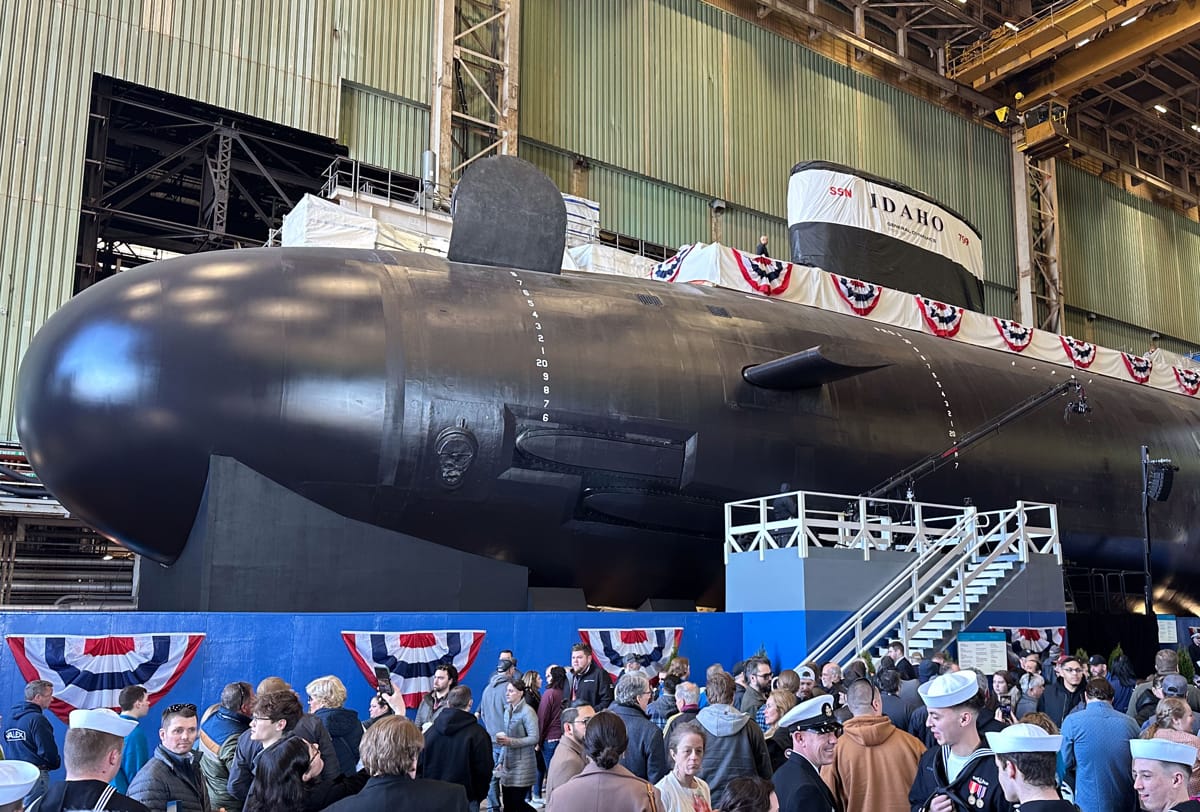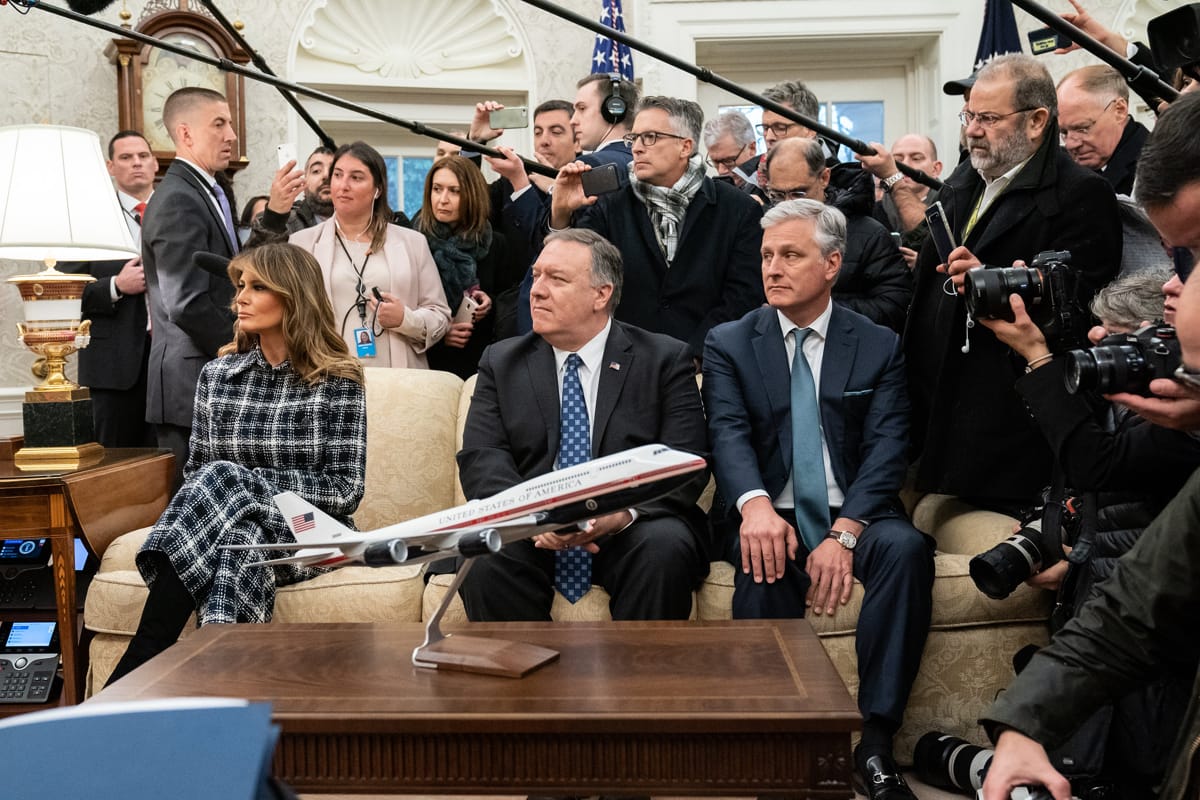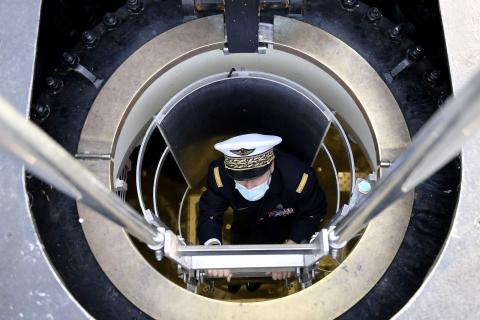AUKUS will survive under the next US president regardless of who wins the election in November.
Joe Biden’s backing seems a no-brainer, given his administration signed the deal. If Donald Trump is elected, chaos could extend to a whole range of issues, not just the future of AUKUS. But I still think the agreement will be honoured.
I find myself in surprising agreement with Trump’s former National Security Advisor John Bolton, who advised commentators to save their breath rather than try to predict the former president’s foreign policy in a second term. Why? Because, at this stage in the campaign, Trump himself does not know.
But with four months until November, that’s a long time to close my mouth and pinch my nose. So here are my top 10 reasons why AUKUS will survive Trump 2.0.
1. Bipartisanship in US politics
In a polarised US political system, competition with China is one of the few points of agreement. Even the far edges of “America First” MAGA ideology are far more focused on negative views of Europe than the Indo-Pacific. In fact, the “America First” movement on the right of the Republican Party is also historically an “Asia First” movement. The deep historical tradition of isolationism was, back in the 1920s and 30s, mostly framed around staying out of Europe in order to focus on the western hemisphere and Asia. AUKUS supports US interests in competition with China.
As the wry Australian political observation has it, “Always back the horse named self-interest, son. It’ll be the only one trying”.
2. Congress
Whoever sits in the Oval Office does not control all US foreign policy powers. The President and Congress command different elements of US foreign policy, leading to frequent clashes. Congress holds the purse strings, which means the legislative branch gets to “influence nearly all manner of foreign policy issues”. In Congress, AUKUS has not only its own caucus but also garners broad-based bipartisan support. Just as Congress blunted Trump’s isolationist instincts by passing “bipartisan language in successive National Defence Authorisation Acts (NDAAs) precluding the Pentagon from reducing troops in South Korea”, so too Congressional support is the biggest and best shield if a second-term Trump sours on AUKUS.
3. The bureaucracy
AUKUS is now deeply embedded in the US bureaucracy across multiple agencies, from the Pentagon to the State Department and the National Security Council. The 2024 NDAA contained critical authorisations for AUKUS that makes it “business as usual” in the US system. It is hard to destroy well established programs backed by Congress. There is no individual in the bureaucracy who Trump could fire on day one, or later, to kill off AUKUS.
4. AUKUS is not an alliance
Trump is well known for his dislike of US alliances, in particular NATO. But, although often erroneously described as an “alliance”, AUKUS is not a collective defence treaty but rather a technology pact built off a security partnership. It is about the co-development and delivery of key technologies from nuclear submarines to enhanced innovation in key sectors such as quantum computing, AI, and cyber. This distinction may well be lost on many, but it’s important to grasp.

5. AUKUS is not part of NATO
Anything to do with the European collective defence alliance reflexively raises the ire of Trump. Given his penchant for personality politics, AUKUS’s ability to rankle French President Emmanuel Macron will only serve to raise a smile from Trump.
Unlike the immigration deal with Australia that Trump inherited from Barack Obama and which caused such friction with then prime minister Malcolm Turnbull, the submarine agreement doesn’t cut across the themes of Trump's campaign.
6. Australia is paying its way on AUKUS
Trump likes to laud himself as a deal-maker, and his concerns over US forces in South Korea and his dislike of NATO stems from his view that allies are not paying their way. AUKUS is different. All three countries are contributing and Australia has put its money where its mouth is, injecting US$3 billion into both the UK and US submarine industrial bases. This brings a twofold outcome. The funding will lift US defence industrial capacity (the US is itself contributing US$21.3 billion), which has long-term benefits for US defence capabilities but also allows for the spare production capacity to sell US Virginia-class SSNs to Australia. As Patrick Triglavcanin has argued in The Interpreter, “AUKUS is a Trump-style deal”.
7. Australia is paying its way on defence
Adding to Australia’s contribution to the submarine industrial base is its defence spending, already sitting at 2.2% of GDP. Under the recently released 2024 National Defence Strategy and integrated investment plan, Australian defence spending will nearly double over the next 10 years, rising to from $55 billion to $100 billion. This means Australia is doing everything Trump asked of US allies last time he was in office: spend more, uplift capability, and make a contribution to collective deterrence. Trump’s former special advisor Steve Bannon says he does not “know anyone on the National Security Committee, anyone in MAGA land, that thinks the Australians either haven’t pulled their weight or when the balloon goes up, they wouldn’t pull their weight”.
8. Ignorance is bliss
Trump doesn’t seem to have a clue about AUKUS. The agreement has only appeared publicly in Trump’s orbit through a leaked conversation with an Australian member of his Mar-a-Lago Club, when he supposedly bragged about classified submarine capabilities. When British politician Nigel Farage interviewed Trump earlier in the year, his question on AUKUS pivoted quickly to one about Australia’s Ambassador to the United States Kevin Rudd. Unlike the immigration deal with Australia that Trump inherited from Barack Obama and which caused such friction with then prime minister Malcolm Turnbull, the submarine agreement doesn’t cut across the themes of Trump's campaign. The biggest risk is that Biden champions AUKUS in upcoming candidates debate, which would reflexively spark Trump’s ire.

9. Trump’s team matters
Who will make up Trump’s National Security leadership team? As US Studies Centre professor Michael Green has argued, there remains a long list of Republicans who would bring strong national security credentials to positions such as Secretary of State, Defence, and Commerce. That list includes Tennessee Senator and former Ambassador to Japan Bill Haggerty, Senators Joni Ernst of Iowa, Tom Cotton of Arkansas and Dan Sullivan of Alaska (all strong AUKUS supporters on the Senate Armed Services Committee) as well as former National Security Advisor Robert O’Brien. There are, however, loyal Trump supporters who question AUKUS, including former Deputy Assistant Secretary of Defence Elbridge Colby and Heritage Foundation researcher Alex Velez-Green. It’s difficult to determine who would have the ear of the President, but the balance of potential candidates for the most senior positions overwhelmingly support AUKUS.
10. Self-interest
As the wry Australian political observation has it, “Always back the horse named self-interest, son. It’ll be the only one trying”. In this era of geostrategic flux, AUKUS is and will remain in the US strategic interest.

